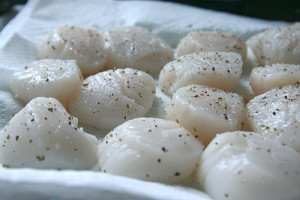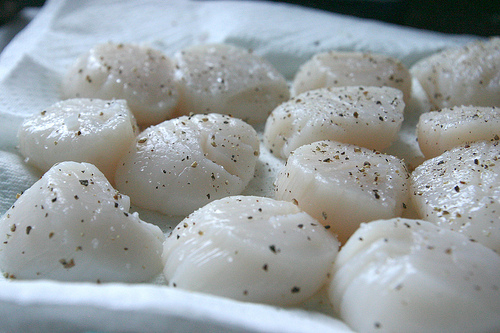Short Answer:
Yes, scallops are Paleo!

All About Scallops…
Scallops are molluscs that have two convexly ridged or scalloped shells. Like oysters, they are also known as bi-valve molluscs. They have s a soft fleshy texture and mild sweet flavor. The nut which is the muscle that opens and closes the shells is the part of the scallop that is commonly consumed. The coral or the reproductive glands of the scallops can be eaten too but is not commonly consumed in the North America.
There are several hundreds of scallop species but the most popular among them are the bay scallops and sea scallops. Sometimes called as weathervane scallops, the sea scallops are the ones normally seen in the menus of most restaurants. The flesh of the sea scallop is large, usually one and a half inches in diameter. Bay scallops on the other hand are tiny and just as sweet as the sea scallops. Bay scallops live in the reedy sea grasses of ocean bays. They are often served in soups, stews, salads, or sometimes on their own.
Scallops are found in many waters throughout the world but not in freshwater.
Health Benefits of Scallops
Scallops are type of shellfish that have a delectable taste and at the same time offer a wide variety of nutritional benefits.
Vitamins and Minerals
Scallops are an excellent source of vitamin B12, phosphorus, selenium, zinc, magnesium and potassium. Vitamin B12 keeps the level of homocysteine, a chemical that damages the blood vessels and is associated with an increased risk of diabetes, heart attack, atherosclerosis and stroke, low.
Potassium and magnesium are beneficial to healthy cardiovascular system. Selenium can help neutralize the effects of harmful free radicals.
Protein
Protein in scallops is remarkable too. For every six ounces of scallops contain 20 grams of protein. Protein is essential for strong bones and muscles and healthy digestion.
Omega 3
Scallop is a rich source of Omega 3 which is also beneficial for healthy heart. Omega 3 fatty acids increase heart rate variability and control blood pressure.
Lower Cholesterol
Saturated fat is present in scallops. They are known to lower levels of cholesterol.
Scallops and Purines
Scallops contain naturally occurring substance like purines which can be harmful to the body. Purines can be broken down into uric acid. Excessive consumption of purines can lead to excess accumulation of uric acid which can result to gout and formation of kidney stones. Individuals with kidney problems or gout must limit or avoid consumption of scallops.
What Experts Say About Scallops… Is It Paleo?
“Just because the masses love ’em doesn’t mean they aren’t good for you. On the contrary, a mere six ounces of scallops provides the RDA for B12 and a decent mix of magnesium, selenium, and zinc, plus 20 grams of protein. Farmed and wild scallops from all over get a good rating from the Seafood Watch, so have at them”. – Mark Sisson
All you ever wanted to know about Scallops and Paleo
Mark’s Daily Apple. A Guide to Crustaceans, Bivalves and Molluscs, or Why You Should Be Eating Exoskeleton-Bearing Aquatic Invertebrates
http://www.marksdailyapple.com/types-of-shellfish/#ixzz3fqQCskEJ
Paleo Porn. Are Scallops Paleo?
http://paleoporn.net/q/are-scallops-paleo/
Original Eating. Scallops
http://www.originaleating.com/paleo-diet-food-list/seafood/scallops/
The World’s Healthiest Foods. Scallops
http://www.whfoods.com/genpage.php/genpage.php?tname=foodspice&dbid=105
Livestrong.com. Are Sea Scallops Healthy?
http://www.livestrong.com/article/313367-are-sea-scallops-healthy/
Did we miss anything?
Comment below and let us know what you think. Do you agree with our conclusion?
photo credit: scallops with creamed corn & tarragon

